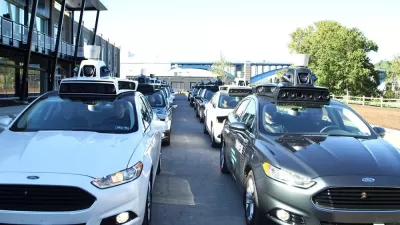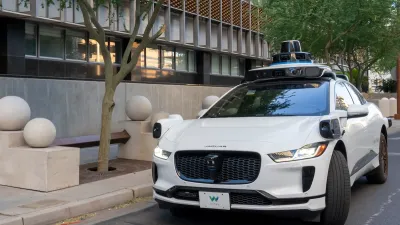California regulators approved new rules for autonomous vehicles, shifting the required human backup from behind the wheel to a remote location.

"Self-driving cars with no human backup behind the wheel will be legal on California roads for testing and transporting the public starting April 2," reports Ethan Baron. "Robot cars have been allowed on the state’s public roads for testing since September 2014, but a safety driver behind the wheel has been required."
The cars will still have a backup—a remotely located human described as a "remote operator" to monitor the car. According to a separate article by Johana Bhuiyan, remote operators "must also be able to communicate with law enforcement as well as the passengers in the event of an accident."
Bhuiyan also reports that the new rules for self-driving cars in California takes a step toward profitability for companies racing into a new market. The need for remote operators of any capacity also ensures new forms of employment to replace the jobs that will surely be lost when autonomous vehicles finally take the road at a large scale.
FULL STORY: Self-driving cars with no in-vehicle backup driver get OK for California public roads

Alabama: Trump Terminates Settlements for Black Communities Harmed By Raw Sewage
Trump deemed the landmark civil rights agreement “illegal DEI and environmental justice policy.”

Planetizen Federal Action Tracker
A weekly monitor of how Trump’s orders and actions are impacting planners and planning in America.

The 120 Year Old Tiny Home Villages That Sheltered San Francisco’s Earthquake Refugees
More than a century ago, San Francisco mobilized to house thousands of residents displaced by the 1906 earthquake. Could their strategy offer a model for the present?

In Both Crashes and Crime, Public Transportation is Far Safer than Driving
Contrary to popular assumptions, public transportation has far lower crash and crime rates than automobile travel. For safer communities, improve and encourage transit travel.

Report: Zoning Reforms Should Complement Nashville’s Ambitious Transit Plan
Without reform, restrictive zoning codes will limit the impact of the city’s planned transit expansion and could exclude some of the residents who depend on transit the most.

Judge Orders Release of Frozen IRA, IIJA Funding
The decision is a victory for environmental groups who charged that freezing funds for critical infrastructure and disaster response programs caused “real and irreparable harm” to communities.
Urban Design for Planners 1: Software Tools
This six-course series explores essential urban design concepts using open source software and equips planners with the tools they need to participate fully in the urban design process.
Planning for Universal Design
Learn the tools for implementing Universal Design in planning regulations.
Clanton & Associates, Inc.
Jessamine County Fiscal Court
Institute for Housing and Urban Development Studies (IHS)
City of Grandview
Harvard GSD Executive Education
Toledo-Lucas County Plan Commissions
Salt Lake City
NYU Wagner Graduate School of Public Service





























